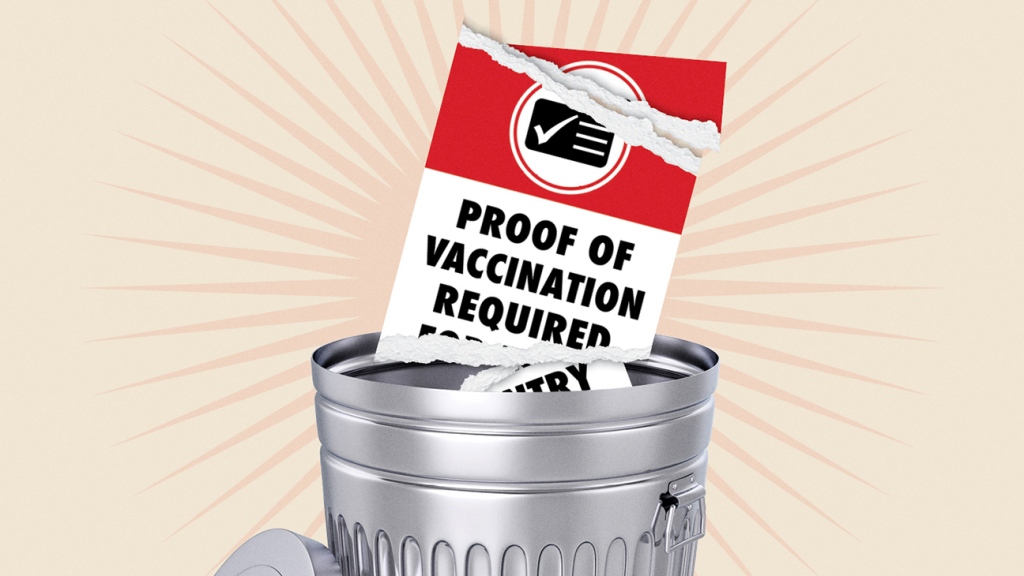
Hollywood’s largest studios are backing away from blanket vaccine mandates on some productions. Disney confirmed Nov. 7 that it had informed 12 TV projects that it will no longer require cast and the crew to be vaccinated.
The projects were told vaccines were no longer required for those in “Zone A” — typically the project’s main actors as well as key crewmembers who work closely with them in the highest-risk areas of the set. (A Disney rep says mandates remain in place on U.S.-based film productions.)
Similarly, Netflix has dropped mandatory vaccine mandates on all new and returning shows from previous seasons, say people with knowledge of the matter who were not authorized to speak publicly. Paramount has done the same for some categories of productions since February. Policies allowing producers to mandate vaccinations in Zone A of sets were first implemented in modifications to the return-to-work agreement in July 2021, when vaccines became widely available.
The latest iteration still empowers producers with the ability to require vaccines, though it appears fewer are choosing to do so as COVID-19 cases and hospitalizations dwindle compared to this time last year. The pivot from some producers in their approach to keeping their sets virus-free is a sign that they might be less wary of the risk of costly production suspensions amid a lull in COVID-19 transmission.
Disney’s move forgoing mandates on some productions comes as some camps in Hollywood’s top guilds and studios negotiating changes to the return-to-work agreement push back against policies requiring vaccines.
SAG-AFTRA President Fran Drescher has been a vocal opponent, urging the guild’s national board in the August issue of the guild magazine to review the “latest scientific information about the vaccine’s efficacy” before agreeing to extend the industry’s mandate. She pointed to “thousands of unvaccinated members still unable to work.”
On Nov. 5, Drescher celebrated the Burbank-based movie giant ending vaccines mandates on several shows. “I must applaud Disney for taking the position,” she said in a video. She detailed her opposition to the policy: “So to think that every human on the planet can take one vaccine is ludicrous. And to make that one vaccine the criteria for who is allowed to work, travel, dine, go to theater, etc. is an infringement on the disabilities act, the freedom of religion act and body sovereignty.”
Revisions to the return-to-work agreement in October included changes to the criteria for when the most stringent protocols go into effect, from positive cases to hospitalizations. The modification could mean that even if there’s an uptick in cases in the next few months, the strictest protocols will only be implemented if those illnesses result in hospitalizations — a threshold less likely to be triggered than positive cases that could belie the rate at which people are contracting the virus.
IATSE explained in its report of the general executive board meeting held in July that hospitalizations is more accurate than positive case results since at-home testing has led to false positives.
Still, employers can opt to institute stricter protocols for masking and testing, and productions can continue to mandate vaccinations in “Zone A” of sets. The unions and studios are also reserving the right to reinstitute past protocols if this winter brings a particularly intense COVID-19 surge as some public health experts are bracing for as people travel for the holidays. After months of waning numbers, Los Angeles officials reported that the seven-day average for daily number of infections rose over the past week, as has the number of patients in county hospitals being treated for the virus.
Bryan Sullivan, an entertainment attorney at Early Sullivan, says studios are still wary of production suspensions caused by virus outbreaks but that they no longer believe that mandates incentivize people to get the vaccine. “At this point, everybody willing to get vaccinated has gotten vaccinated,” he says. “It appears that the studios, or certainly Disney, see the mandate as not being necessary to protect the set.”
As studios move away from mandates on some productions, lawsuits from cast and crewmembers alleging they were unjustly fired for refusing to get the vaccine work their way through the courts. A federal judge on Nov. 4 found that Disney and 20th Television do not have to face a disparate impact claim, which accused them of advancing a vaccination policy discriminating against followers of the Church of Universal Wisdom, in a suit from former 911 actor Rockmond Dunbar over his dismissal from Fox’s hit drama series. They still face 10 other claims, ranging from religious and racial discrimination to retaliation and breach of contract.
Other lawsuits challenging vaccination mandates include those from former General Hospital actor Ingo Rademacher and two former crewmembers. They accused ABC of discrimination for refusing to grant them religious exemptions, among some other claims.
A common target across the suits has been the way in which Disney and its affiliates handle requests for exemptions. It appears that the interviews vetting requests are conducted by Disney lawyers, who look into the backgrounds of the individuals who are requesting exemptions. Dunbar’s religious exemption was denied because he had previously received tattoos and ear piercings in violation of his beliefs as a member of the Church of Universal Wisdom. He, Rademacher and the two former General Hospital crewmembers all allege they were unfairly refused exemptions.
Katie Kilkenny contributed reporting.
A version of this story first appeared in the Nov. 9 issue of The Hollywood Reporter magazine. Click here to subscribe.

